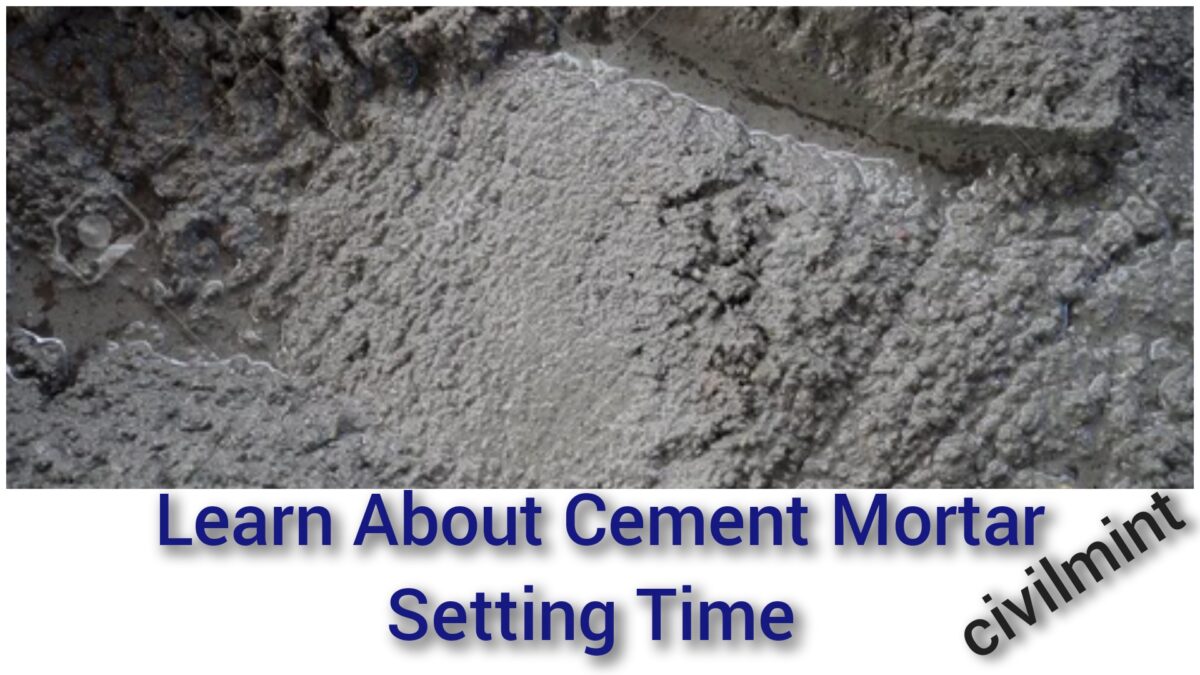This article explains cement mortar setting time, initial setting time, final setting time and effect of time on setting of cement mortar.

Table of Contents
What Is Cement Mortar Setting Time?
Cement mortar setting time indicates to the time it takes for the cement mortar to harden or set after it is mixed with water.
The setting time of cement mortar is an important factor to consider during construction as it can affect the strength and durability of the structure being built.
There are two types of setting times for cement mortar: initial setting time and final setting time.
The initial setting time is the time it takes for the mortar to set to a point where it can no longer be easily molded or shaped.
The final setting time is the time it takes for the mortar to completely harden and gain its full strength.
The setting time of cement mortar can vary depending on factors such as the type of cement used, the water-to-cement ratio, the temperature and humidity of the environment, and the presence of any additives or admixtures in the mix.
Normally, the initial setting time for cement mortar is around 30 minutes to 1 hour, while the final setting time is around 6 to 8 hours. But, these times can vary depending on the specific circumstances and materials being used.
Intial Setting Time Of Cement Mortar
The initial setting time of cement mortar is the period of time that elapses between adding water to the cement and when the mortar starts to harden and lose its pliability. This is a critical factor when working with cement-based materials because it affects the time available for placing, compacting, and finishing the mortar before it becomes stiff and difficult to work with.
To determine the initial setting time of cement mortar, a tool called a Vicat apparatus is used. This device features a small metal plunger that is dropped onto the surface of the mortar at regular intervals. The test is considered complete when the plunger can no longer penetrate the surface of the mortar by a predetermined amount.
Several factors can influence the initial setting time of cement mortar, including the type and composition of the cement, the amount of water used, and the temperature and humidity of the environment in which the mortar is applied. Typically, the initial setting time of cement mortar ranges from 30 minutes to 3 hours.
Final Setting Time Of Cement Mortar
When working with cement mortar, the final setting time refers to the moment when the mixture has hardened to a point where it can no longer be reshaped or molded. The ASTM C 266-17 standard specifies this as the point when the penetration resistance of the mortar reaches 500 psi (3.45 MPa).
The final setting time of cement mortar can vary depending on a variety of factors, such as the type and quantity of cement used, the water-cement ratio, and the temperature and humidity of the surrounding environment. Any additives or admixtures can also affect the final setting time, which can take anywhere from a few hours to several days.
Final setting time is different from the initial setting time, which is when the mixture begins to stiffen and lose its plasticity. As per ASTM C 266-17, the initial setting time is reached when the penetration resistance of the mortar reaches 100 psi (0.69 MPa).
Effect Of Time On Setting Of Cement Mortar
The chemical reaction that hardens and binds the mixture of cement mortar with sand or other aggregates is triggered as water in the mix reacts with the cement. This reaction causes the mixture to become more rigid and solid over time until it reaches its final strength.
The time it takes for cement mortar to set is influenced by several factors, including mix composition, temperature, humidity, and water-cement ratio. The mixture begins to harden during the initial setting time and gains enough strength to resist external forces like weight or pressure during the final setting time.
It is crucial to allow the mixture to fully set before applying any external forces as the setting time can vary between a few hours and several days.
